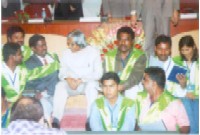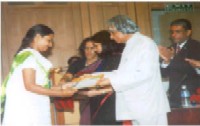|
National Virtual Academy
2005 Priyanka Pant ppant@tarahaat.com The Jamsetji Tata National Virtual Academy (NVA) for Rural Prosperity was established in 2004, on the occasion of the death centenary of Jamsetji Tata supported by a generous endowment grant from the Tata Education Trust. The main aim of the NVA is to bring together the experts and grassroots level communities in two-way communication, with the objective that knowledge should reach every home and hut. The selection of NVA Fellows was done on the basis of a Peer Review Process and not on the basis of patronage. Also, the principle of social inclusion is adopted in the selection process. It is in recognition of the SOCIAL COMMITMENT OF THE INDIVIDUAL TO DO ‘PUBLIC GOOD’. The NVA aims to connect frontier technology with resource poor rural women and men and enables them to become masters of their own destiny. It also aim to help create large numbers of knowledge workers in our villages, many of whom will be women. In this manner, NVA bridges the gender divide. The NVA is an important arm of Mission 2007 to train the one million army of knowledge workers (NVA Fellows), who will be the torch bearers of the movement to realize Mission 2007: ‘Every Village a knowledge Centre’.
This year, the second convocation of Jamsetji TATA National Virtual Academy (NVA) took place on July 11, 2005 at Delhi. A total of 137 selected women and men were awarded the NVA fellowship by the Honorable President of India, Dr. A. P. J Abdul Kalam and Dr. M. S. Swaminathan, Founder, MSSRF. Five bright representatives of TARAhaat were also awarded the NVA fellowship on the same day. Since its inception, TARAhaat has successfully demonstrated a variety of applications of information technology (IT) for the welfare of the rural populace- even with low investment. Profile of Fellows from TARAhaat Priti Sharma Priti, a 24 year old graduate hails from Orchha, a very small village in the Tikamgarh district of Madhya Pradesh. She has been involved in community activities for about two years. When TARAhaat initiated its TARAkendra in 2002, she enrolled to study the Tally accounting course. Impressed by her commitment and sincerity, Priti was immediately appointed as an instructor at the TARAkendra. She also continued to persue her Post Graduation studeis in Sociology. She is currently in-charge of implementing the Open Knowledge Network (OKN) programme for information sharing across communities in the Bundelkhand region. Manmohan Singh Bhari A Graduate in Arts from Patiala, Punjab University with the zeal to educate the rural people and empower them with the knowledge of IT, Manmohan Singh Bhari has been instrumental in popularizing Information Technology and its application at Government schools and colleges through presentations and road shows. Hari Shankar Chourasia Hari Shankar hails from a village called Teherka in the Tikamgarh district of Madhya Pradesh. The 25 year old post graduate (M.A. Political Science) has been involved in community activities since 2003 as a TARAKendra Coordinator. Hari Shankar was exposed to computers while pursuing his graduation from Niwari, a tehsil town of Teherka. He could have easily opted for a livelihood in the town, but he opted to work for the development of his own village. Today, as a Kendra Coordinator, he teaches the students computers and promotes Information Technology amongst his community members. As a part of TARAhaat’s e-governance program, Hari Shanker assists the people of his and surrounding villages in registering their grievances with the government electronically through the Internet. Rajamani Parmar & Priti Pamar Belonging to the most illiterate and poorest area of India, the Parmar sisters would normally have got married at an early age. But they chose to bring benefits of Information technology to their village in Uttar Pradesh and also earn a decent revenue for their family. Rajmani is a 25 year old girl with M.A in sociology, and Priti, her sister, is 24 years old-a graduate in sociology and economics. The sisters used their foresight and decided to open a TARAkendra at Punavali Kalan, a small village in Jhansi with a population of 4000. For the last four years, they are successfully running the TARAkendra against all odds such as power cuts, lack of connectivity, poor infrastructure etc. q
|

